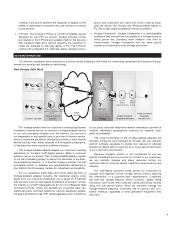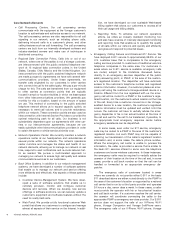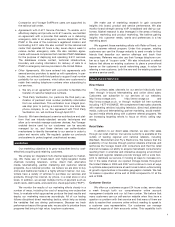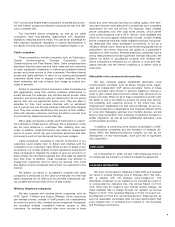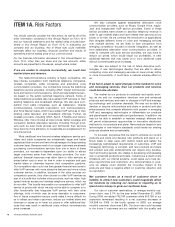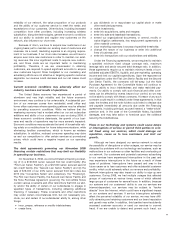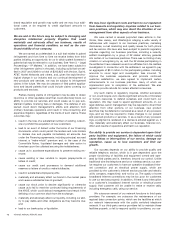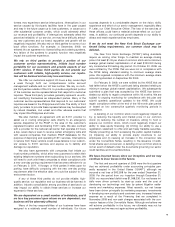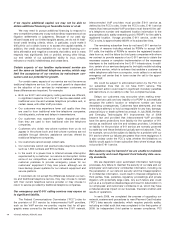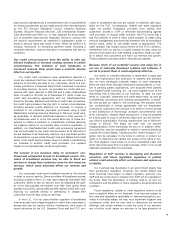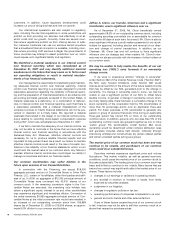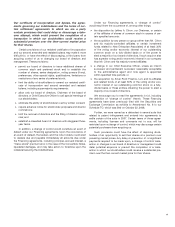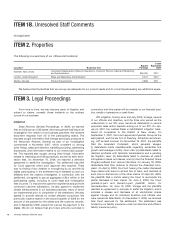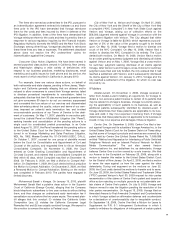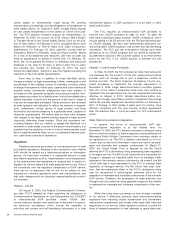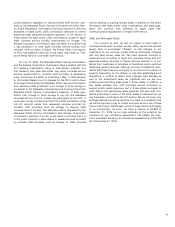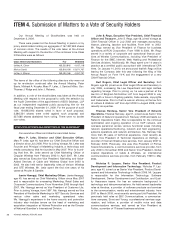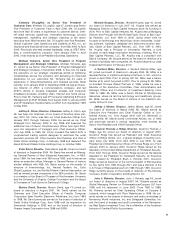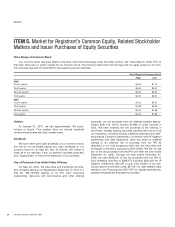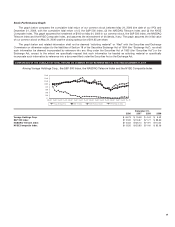Vonage 2009 Annual Report Download - page 23
Download and view the complete annual report
Please find page 23 of the 2009 Vonage annual report below. You can navigate through the pages in the report by either clicking on the pages listed below, or by using the keyword search tool below to find specific information within the annual report.data security standards are a comprehensive set of requirements
for enhancing payment account data security that was developed
by the PCI Security Standards Council including American
Express, Discover Financial Services, JCB International, Master-
Card Worldwide and VISA Inc., to help facilitate the broad adop-
tion of consistent data security measures. Failure to comply with
the security requirements as identified in subsequent audits or
rectify a security issue may result in fines. While we believe it is
unusual, restrictions on accepting payment cards, including a
complete restriction, may be imposed on companies that are not
compliant.
Our credit card processors have the ability to take sig-
nificant holdbacks or increase existing reserves in certain
circumstances. The initiation of such holdbacks or
increased reserves likely would have a material adverse
effect on our liquidity.
Our credit card processors have established reserves to
cover any exposure that they may have as we collect revenue in
advance of providing services to our customers, which is a cus-
tomary practice for companies that bill their customers in advance
of providing services. As such, we provided our credit card pro-
cessors with cash reserves of $22,423 and a cash collateralized
letter of credit for $10,500 as of December 31, 2009. Under our
credit card processing agreements with our Visa/MasterCard,
American Express, Barclays and Discover credit card processors,
the credit card processor has the right, in certain circumstances,
including adverse events affecting our business, to impose a
holdback of our advanced payments purchased using a Visa/
MasterCard, American Express, Barclays or Discover credit card,
as applicable, or demand additional reserves or other security. If
circumstances were to occur that would allow any of these pro-
cessors to initiate a holdback or considerably increase reserves,
the negative impact on our liquidity likely would be significant. In
addition, our Visa/MasterCard credit card processing agreement
may be terminated by the credit card processor at its discretion if
we are deemed to be financially insecure. As a significant portion
of payments to us are made through Visa and MasterCard credit
cards, if the credit card processor does not assist in transitioning
our business to another credit card processor, the negative
impact on our liquidity likely would be significant.
The success of our business relies on customers’ con-
tinued and unimpeded access to broadband service. Pro-
viders of broadband services may be able to block our
services or charge their customers more for also using our
services, which could adversely affect our revenue and
growth.
Our customers must have broadband access to the Internet
in order to use our service. Some providers of broadband access,
including outside of the U.S., may take measures that affect their
customers’ ability to use our service, such as degrading the qual-
ity of the data packets we transmit over their lines, giving those
packets low priority, giving other packets higher priority than ours,
blocking our packets entirely or attempting to charge their
customers more for also using our services.
In the U.S., it is not clear whether suppliers of broadband
Internet access have a legal obligation to allow their customers to
access and use our service without interference. As a result of
recent decisions by the U.S. Supreme Court and the FCC, pro-
viders of broadband services are subject to relatively light regu-
lation by the FCC. Consequently, federal and state regulators
might not prohibit broadband providers from limiting their
customers’ access to VoIP or otherwise discriminating against
VoIP providers. In August 2008, however, the FCC found that it
had the authority to order a major cable operator to cease using
network management practices that interfered with its broadband
service users’ ability to use certain types of applications. The
cable operator has sought judicial review of the FCC’s decision.
Interference with our service or higher charges for also using our
service could cause us to lose existing customers, impair our abil-
ity to attract new customers and harm our revenue and growth.
These problems could also arise in international markets.
Because much of our potential success and value lies in
our use of internally developed systems and software, if
we fail to protect them, it could negatively affect us.
Our ability to compete effectively is dependent in large part
upon the maintenance and protection of systems and software
that we have developed internally based on open standards.
While we have three internally developed issued patents, a num-
ber of pending patent applications, and acquired three patents
from Digital Packet Licensing, Inc., we cannot patent much of the
technology that is important to our business. To date, we have
relied on copyright, trademark and trade secret laws, as well as
confidentiality procedures and licensing arrangements, to estab-
lish and protect our rights to this technology. We typically enter
into confidentiality or license agreements with our employees,
consultants, customers and vendors in an effort to control access
to and distribution of technology, software, documentation and
other information. Despite these precautions, it may be possible
for a third party to copy or otherwise obtain and use this technol-
ogy without authorization. Policing unauthorized use of this tech-
nology is difficult. The steps we take may not prevent
misappropriation of the technology we rely on. In addition, effec-
tive protection may be unavailable or limited in some jurisdictions
outside the United States, Canada and the United Kingdom. Liti-
gation may be necessary in the future to enforce or protect our
rights or to determine the validity and scope of the rights of oth-
ers. That litigation could cause us to incur substantial costs and
divert resources away from our daily business, which in turn could
materially adversely affect our business.
Regulation of VoIP services is developing and therefore
uncertain, and future legislative, regulatory or judicial
actions could adversely affect our business and expose us
to liability.
Our business has developed in an environment largely free
from government regulation. However, the United States and
other countries have begun to assert regulatory authority over
VoIP and are continuing to evaluate how VoIP will be regulated in
the future. Both the application of existing rules to us and our
competitors and the effects of future regulatory developments are
uncertain.
Future legislative, judicial or other regulatory actions could
have a negative effect on our business. If we become subject to
the rules and regulations applicable to telecommunications pro-
viders in individual states, we may incur significant litigation and
compliance costs, and we may have to restructure our service
offerings, exit certain markets or raise the price of our services,
any of which could cause our services to be less attractive to
15


